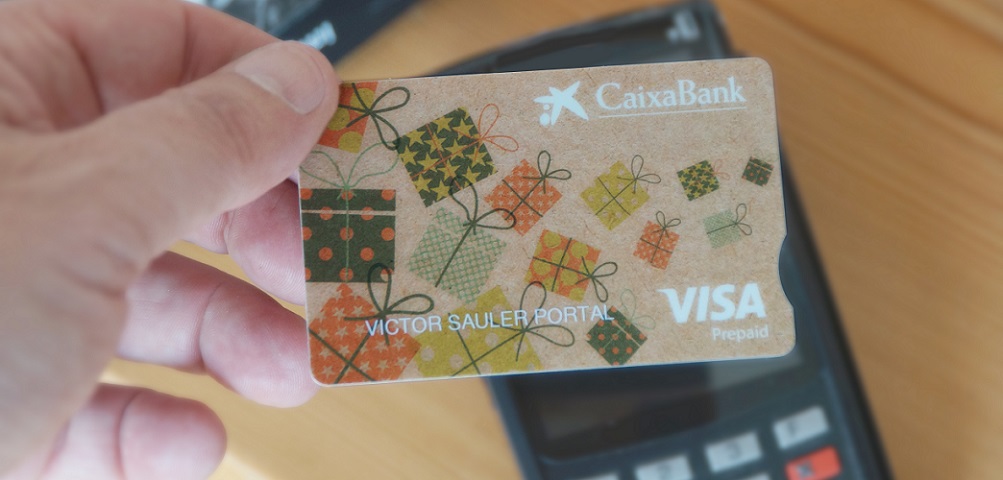
This September, CaixaBank will start releasing its first biodegradable cards, and expects to distribute around 150,000 units per year. It is a new type of card that can be acquired in any branch of the CaixaBank network, in the format of a gift card. In fact, from now on, all gift cards issued by CaixaBank will be biodegradable.
„The launch of this product represents a significant step forward in a plan specifically designed to reduce the environmental impact of the Company’s cards, a business in which CaixaBank is the leading company in Spain, with a total of 17.4 million cards and a market share of 23.38% in terms of turnover. The plan includes both replacing the manufacturing material of the range of gift cards, and creating a new recycling programme for all card types.”, according to the press release.
Cards manufactured with corn starch and biomass
CaixaBank’s gift cards will now be fully made from a biodegradable material, primarily formed of polylactic acid (PLA), a bioplastic obtained from corn starch. The other components of the card are biomass. The result is an organic, biodegradable card, which is more environmentally friendly than traditional plastic, which comes from oil and decomposes over a period of 100 to 1,000 years.
Cards that use this material last for approximately two years, which makes it an ideal material for the gift cards, which expire within a maximum period of two years.
As well as being biodegradable, the new CaixaBank cards use a different manufacturing process, which halves the carbon footprint of their production and entails the reduction of practically half the CO2 emitted: going from 30kg of CO2 emissions per 1,000 cards made with PVC, to 15.5 kg per 1,000 cards in this material.
In order for customers to clearly recognise the biodegradable cards, CaixaBank is presenting a new design, with a more environmentally-friendly and minimalist feel, including a logo that indicates that it is a biodegradable product.
In parallel to the launch of these new biodegradable cards, CaixaBank is continually analysing the materials that offer better durability to reduce the number of card replacements and thus reduce their carbon footprint. To find the most suitable ecological material, CaixaBank is testing alternative materials to PVC, which is what cards with chips and contactless technology are currently made of.
One of the recent measures derived from this research process is the implementation of new magnetic bands that are more resistant to demagnetisation, which is one of the main reasons that customers replace their cards.
Additionally, CaixaBank is committed to digitising cards, reducing the environmental impact as this avoids the need to manufacture or send a PVC card to the customer, and will also extend the validity from 5 years to 7.
Contribution to the circular economy
Meanwhile, CaixaBank has also introduced a new process for recycling all its cards, both those made from biodegradable materials and those made from traditional plastics. From now on, customers will hand in their expired cards at their branch, which will take care of activating the recycling circuit established for each model.
Specifically, the procedure consists in separating the card’s different components (chip, magnetic strip, plastic or biodegradable material) and distributing them across the dedicated channels for recycling them.
New CaixaBank cards are CO2 neutral, because CaixaBank offsets 100% of its calculated emissions. In fact, CaixaBank is the only Ibex 35 company that offsets its entire calculated carbon footprint, including indirect emissions. Last year, it reached this milestone with the support of a wind farm in southern India, and a reforestation project in an area that had burned in the mountain of Montserrat.
Banking 4.0 – „how was the experience for you”
„To be honest I think that Sinaia, your conference, is much better then Davos.”
Many more interesting quotes in the video below: